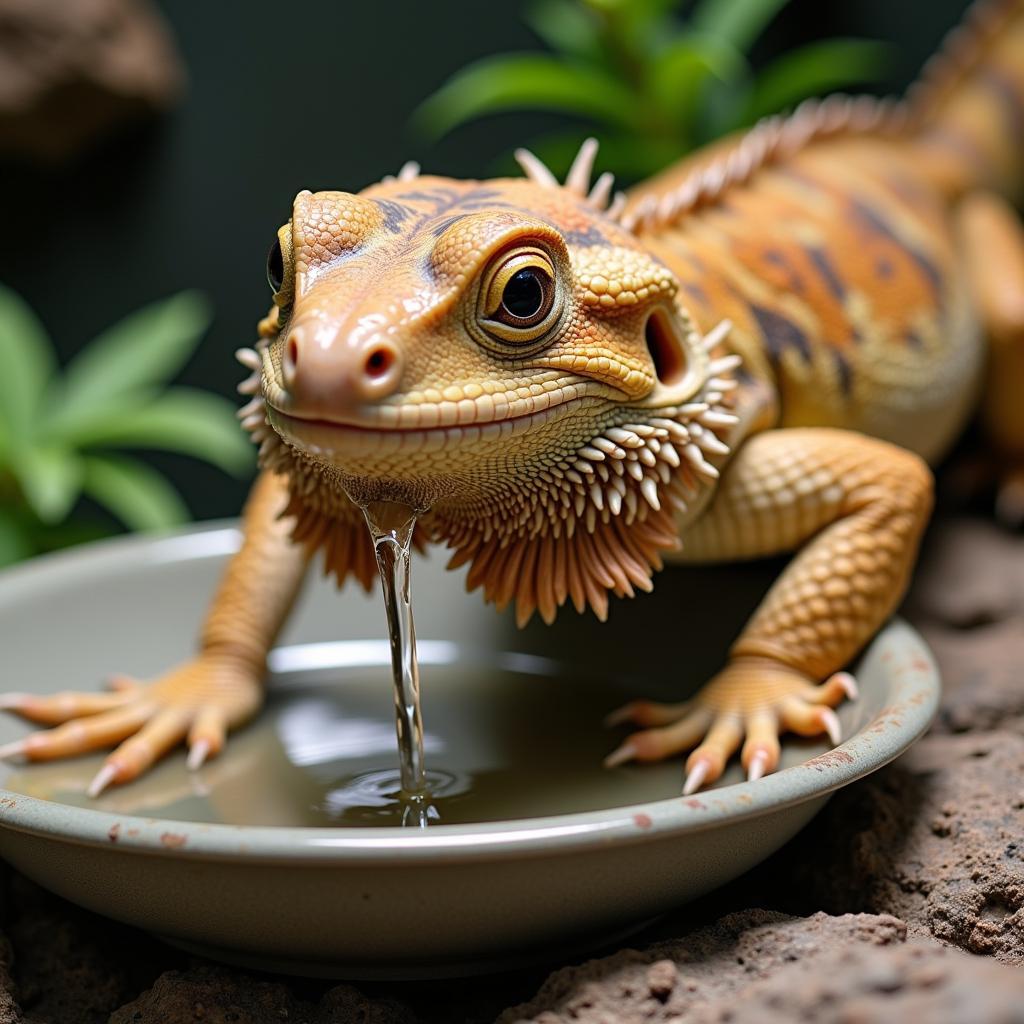Bearded dragons, those captivating reptiles with their spiky beards and inquisitive eyes, have captivated the hearts of many pet enthusiasts. As a responsible bearded dragon owner, you’re likely well-versed in their dietary needs, ensuring a healthy balance of insects and greens. But what happens when your scaly companion decides to skip a meal… or five?
Understanding how long a bearded dragon can survive without food is crucial, but it’s not as straightforward as a single number. The answer depends on various factors, including age, health, environment, and the reason behind their fasting. Let’s delve deeper into the fascinating world of bearded dragon digestion and learn how to keep your pet healthy and happy.
Why is My Bearded Dragon Not Eating?
Before we delve into the timeframe, it’s crucial to identify the potential reasons behind your bearded dragon’s lack of appetite. Here are some common culprits:
1. Age and Life Stage: Baby bearded dragons have different dietary needs than adults. They require more frequent feedings due to their rapid growth and development.
2. Environmental Factors: Temperature and lighting play a crucial role in a bearded dragon’s metabolism and appetite. If their enclosure is too cold or lacks proper UVB lighting, it can affect their digestion and appetite.
3. Illness or Parasites: Just like any other animal, bearded dragons can experience a loss of appetite due to illness or parasites. If you notice other symptoms like lethargy, weight loss, or changes in stool, it’s essential to consult a veterinarian specializing in reptiles.
4. Brumination: During the colder months, bearded dragons may enter a period of brumation, a state of dormancy similar to hibernation. During this time, they may refuse food altogether.
5. Stress or Change in Environment: A move to a new enclosure, the introduction of a new tank mate, or even loud noises can cause stress in bearded dragons, leading to a temporary loss of appetite.
So, How Long Can They Actually Go Without Food?
While the specific duration varies, here’s a general guideline:
-
Healthy Adult Bearded Dragons: In optimal conditions, a healthy adult bearded dragon can survive for 2-3 weeks without food. However, it’s important to note that this is the absolute maximum and not something to be tested.
-
Juvenile Bearded Dragons: Young, growing bearded dragons need to eat almost daily. They should not go without food for more than 24 hours.
-
Bearded Dragons in Brumation: During brumation, bearded dragons can survive for extended periods without food, sometimes up to several months. However, they should still have access to fresh water.
 Bearded Dragon Hydrating from a Water Dish
Bearded Dragon Hydrating from a Water Dish
When to Worry and Seek Veterinary Care
It’s important to remember that these are just guidelines. If your bearded dragon refuses food for more than a day or two, or if you notice any other concerning symptoms, it’s crucial to contact your veterinarian immediately.
Here are some red flags to watch out for:
- Significant weight loss
- Lethargy or weakness
- Changes in stool consistency or color
- Sunken eyes
- Loss of skin elasticity
“A bearded dragon’s refusal to eat is often the first sign that something is amiss,” says Dr. Emily Carter, a veterinarian specializing in exotic animals. ” Early intervention is key to ensuring their well-being.”
Tips to Encourage a Healthy Appetite
-
Optimal Enclosure Setup: Ensure their enclosure is at the correct temperature and humidity levels. Provide a basking spot with temperatures reaching 95-100°F (35-38°C) and a cooler side around 75-80°F (24-27°C).
-
Varied Diet: Offer a variety of insects and vegetables to prevent boredom and ensure they receive a balanced intake of nutrients.
-
Food Size: Ensure food items are appropriately sized for your bearded dragon. A good rule of thumb is that the food should be no larger than the space between their eyes.
-
Gut-Loading and Dusting: Feed insects a nutritious diet before offering them to your bearded dragon. Dust insects with calcium and vitamin D3 supplements to ensure proper bone health.
In Conclusion: A Proactive Approach is Key
While bearded dragons can withstand periods without food, it’s crucial to understand the underlying reasons behind their fasting and act accordingly. By providing a stimulating environment, a balanced diet, and regular veterinary checkups, you can help ensure your scaly friend lives a long and healthy life.
If you have any concerns about your bearded dragon’s health or appetite, don’t hesitate to reach out to our team at Mina Cones Food. Contact us at Phone Number: 02437655121, Email: minacones@gmail.com Or visit us at 3PGH+8R9, ĐT70A, thôn Trung, Bắc Từ Liêm, Hà Nội, Việt Nam. We have a dedicated customer support team available 24/7 to assist you.